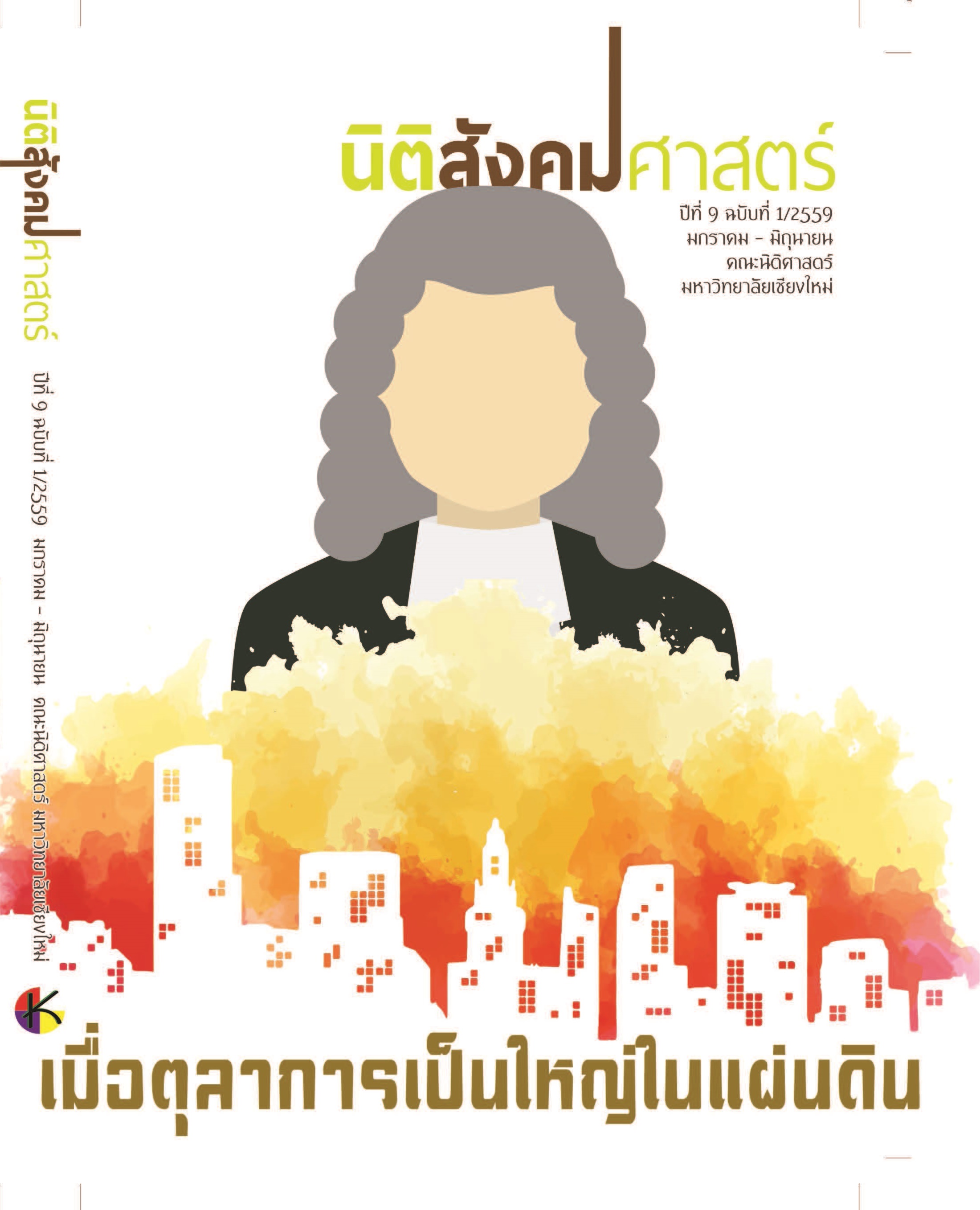การปกครองโดยตุลาการ Gouvernment by Judges
Main Article Content
บทคัดย่อ
หากจะกล่าวว่ายุคศตวรรษที่ 20 เป็นยุคแห่งอำนาจรัฐสภา รัฐสภามีอำนาจ สูงสุดเด็ดขาด เป็นศตวรรษที่โลกได้พิสูจน์ว่าการปกครองระบอบประชาธิปไตยโดย ผ่านทางผู้แทนในระบบรัฐสภา แม้จะไม่อาจกล่าวว่าดีที่สุด แต่ก็กล่าวได้ว่าเป็นระบบ การปกครองที่เลวร้ายน้อยที่สุดเมื่อเทียบกับการปกครองระบอบอื่นที่มนุษยชาติได้ คิดค้นขึ้นมา ในขณะที่นับแต่ปลายศตวรรษที่ 20 เข้าสู่ศตวรรษที่ 21 รัฐสภาเริ่มเสื่อม อำนาจและเสื่อมความศักดิ์สิทธิ์ลงอย่างเห็นได้ชัด และเกิดขึ้นทั่วโลก กลายเป็นองค์กร ตุลาการที่เข้ามามีอำนาจมากขึ้น คำกล่าวที่ว่านี้ คงไม่ใช่คำกล่าวที่เกินเลยไปจากความ เป็นจริง การปรากฏตัวของสำนวน “การปกครองโดยตุลาการ” เสมือนเป็นสัญญาณ บ่งบอกถึงอำนาจที่เพิ่มมากขึ้นขององค์กรตุลาการ บทความนี้ มุ่งศึกษาวิเคราะห์ ทฤษฎีกฎหมายรัฐธรรมนูญที่พัฒนามาสู่ยุคกฎหมายหลังสมัยใหม่ (Le droit post-moderne) ในรัฐที่ก้าวเข้าสู่ยุค “รัฐหลังสมัยใหม่” (L’Etat post-moderne) เพื่อ ทำความเข้าใจปรากฏการณ์ที่เรียกว่า “การปกครองโดยตุลาการ” หรือ “รัฐบาล ตุลาการ” (Le gouvernement des juges) ในมุมมองของนักกฎหมายรัฐธรรมนูญ ฝรั่งเศส โดยมุ่งหมายจะเปิดประเด็นใหม่ๆ ในทางวิชาการกฎหมายรัฐธรรมนูญ จาก การศึกษาบทความ การอภิปรายทางวิชาการ และตำรากฎหมายรัฐธรรมนูญหลาย เล่มที่มีการศึกษาแนวคิดเรื่องนี้ตั้งแต่ต้นศตวรรษที่ 20 จนปัจจุบันเข้าสู่ศตวรรษที่ 21 นักกฎหมายรัฐธรรมนูญฝรั่งเศสได้ศึกษาข้อความคิดนี้อย่างชัดเจนมากขึ้น
It can be said that the 20th century was the era of the Parliament where the Congress has the ultimate authority. Through century the world has proved that the representative democracy in Parliament System, although it may not be the best system, is comparatively less evil than other systems mankind has invented. However, from the late 20th century into the 21st century, the Congress began to lose power and sanctity drastically. And this phenomenon occurs worldwide. It is not overstated to say that the judges become more powerful. The presence of "Rule of judges" is a sign of the growing power of the judiciary. This article aims to analyze the postmodern legal theory of constitutional law developed in the state entering the era "Postmodern states" to better understand the phenomenon called "Government by Judiciary" in view of the French constitutional scholars. The aim is to open new issues in constitutional law by studying the article, academic debate, Constitutional law textbooks that have studied the issue since the early 20th century and now into the 21st century, the French Constitutional scholars think more clearly in this issue.
Article Details
O ความคิดเห็นใดๆ ที่ลงตีพิมพ์ใน CMU Journal of Law and Social Sciences เป็นของผู้เขียน (ความคิดเห็นใดๆ ของผู้เขียน กองบรรณาธิการ CMU Journal of Law and Social Sciences ไม่จำเป็นต้องเห็นด้วย)
O กองบรรณาธิการ CMU Journal of Law and Social Sciences ไม่สงวนสิทธิ์ในการคัดลอกแต่ให้อ้างอิงแหล่งที่มาด้วย
เอกสารอ้างอิง
Book
BRONDEL Séverine, FOULQUIER Norbert et HEUSCHLING Luc (sous la direction de), (2001), Gouvernement des juges et démocratie, Paris, Publications de la Sorbonne.
CHEVALLIER Jacques, (2004), L’Etat post-moderne, 2e édition, Paris, LGDJ.
GREWE Constance, JOUANJAN Olivier, MAULIN Eric, WACHSMANN Patrick (sous la direction de), (2005), La notion de la justice constitutionnelle, Paris, Dalloz.
KELSEN Hans, (2006), Qui doit être le gardien de la constitution ?,.
LAMBERT Edouart, (2005), Le gouvernement des juges et la lutte contre la législation sociale aux Etats-Unis. L’experience américaine du controle judiciaire de la constitutionnalité des lois, Dalloz.
ROUSSEAU Dominique, La justice constitutionnelle en Europe, 1998
ROUSSEAU Dominique, Droit du contentieux constitutionnel, 2001
TROPER Michel, CHAGNOLLAUD Dominique, Traité international de droit constitutionnel. Tome I. 2012.
Article
BREDIN Jean-Denis, (1994), Un gouvernement des juges ?, Pouvoirs, numéro 68, pp. 77-85.
TROPER Michel, (2001), Le bon usage des spectres : du gouvernement des juges au gouvernement par les juges, Mélanges en l'honneur de Gérard Conac, Economica, Paris, 2001, p. 49.

